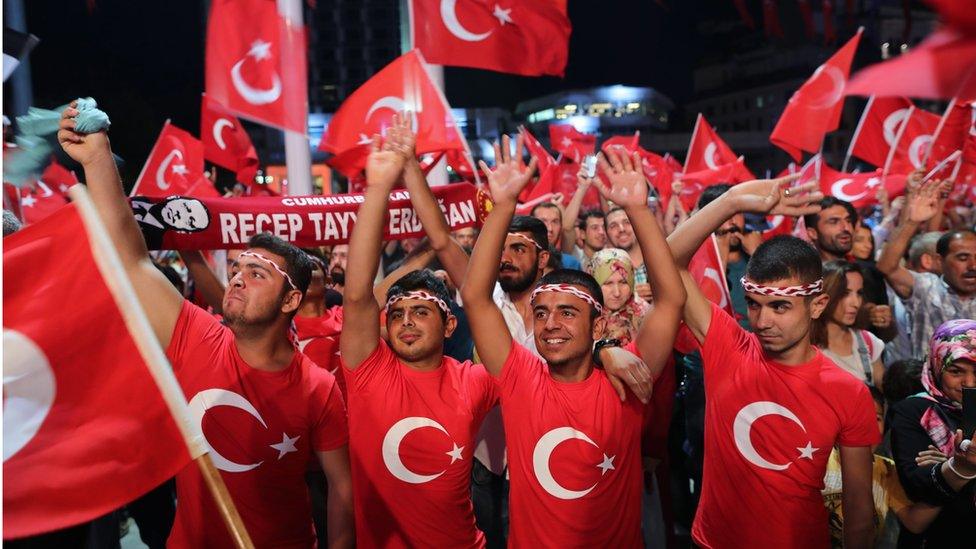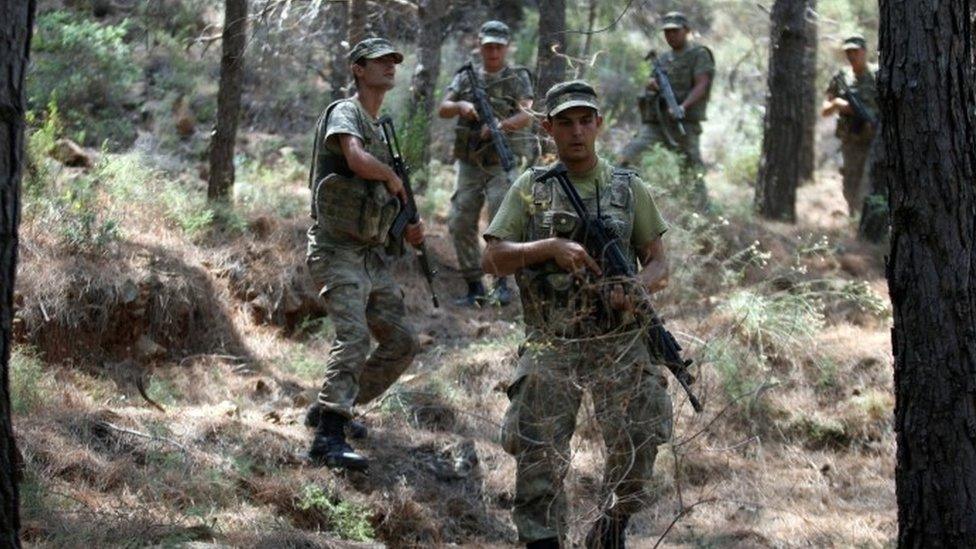Turkey failed coup: Nephew of US-based cleric Fethullah Gulen held
- Published
There may be more arrests to come, says Turkey's deputy prime minister
Turkey has detained the nephew of US-based cleric Fethullah Gulen, in connection with the failed coup attempt, state media report.
Muhammet Sait Gulen will be taken to the capital, Ankara, from Erzurum, the eastern region where his uncle was born, the Anadolu news agency says.
Turkey's President Recep Tayyip Erdogan blames the coup attempt on Mr Gulen.
Earlier, the president extended the period in which suspects can be detained without charge to 30 days.
A statement carried by state media also ordered the closure of more than 1,000 private schools and more than 1,200 associations.
The moves follow the state of emergency declared on Wednesday in the wake of the failed coup.
Second detention
Muhammet Sait Gulen is reportedly also wanted over the leak of questions from 2010 civil service exams.
Gulen has been called the second most powerful man in Turkey
In May this year, another nephew of the cleric was detained in connection with schools run by Mr Gulen's Hizmet movement, according to a state media report at the time.
Mr Gulen, who was once an ally of Mr Erdogan but then fell out with him, has denied any involvement in the coup attempt.
The Turkish leader has said the state of emergency will allow the authorities to restore order and deal with the aftermath of the failed coup effectively.
At least 60,000 state employees have been detained or suspended in an internationally criticised purge.

Many Turkish people support the measures President Erdogan has taken since the failed coup
Education ministry officials, private schoolteachers and university heads of faculty together account for more than half the people targeted.
The schools and associations whose closures have now been ordered are suspected of having links to Mr Gulen, Anadolu says.
Other institutions ordered to be shut down included 19 trade unions, 15 universities and 35 medical institutes, the agency said.
Also on Saturday, Ankara's chief prosecutor Harun Kodalak was reported by Turkish media as saying that 1,200 soldiers detained in the wake of the coup had been released.
Those freed were said to be low-ranking soldiers. Thousands of other service personnel, including more than 100 generals and admirals, external, remain in detention.
'Biased and prejudiced'
The state of emergency allows the president and cabinet to bypass parliament when drafting new laws and to restrict or suspend rights and freedoms.

The Turkish military has been searching for missing soldiers suspected of involvement in the coup attempt
Imposition of the measures has been criticised by France and Germany, as well as top EU officials, but Turkey has defended its actions, saying only those "100% identified" with those behind the coup are being targeted.
Mr Erdogan told France 24 television, external on Saturday that the EU was "biased and prejudiced" against Turkey.
Human rights groups including Amnesty International had warned Turkey against extending the period allowed for detention without charge, which previously stood at a maximum of four days.
Amnesty has said Mr Erdogan is going "well beyond what might be considered a legitimate response to the coup attempt".
Other critics have accused him of consolidating power on a scale largely unprecedented since Turkey's first democratic elections in 1946.